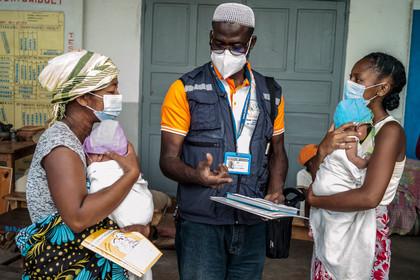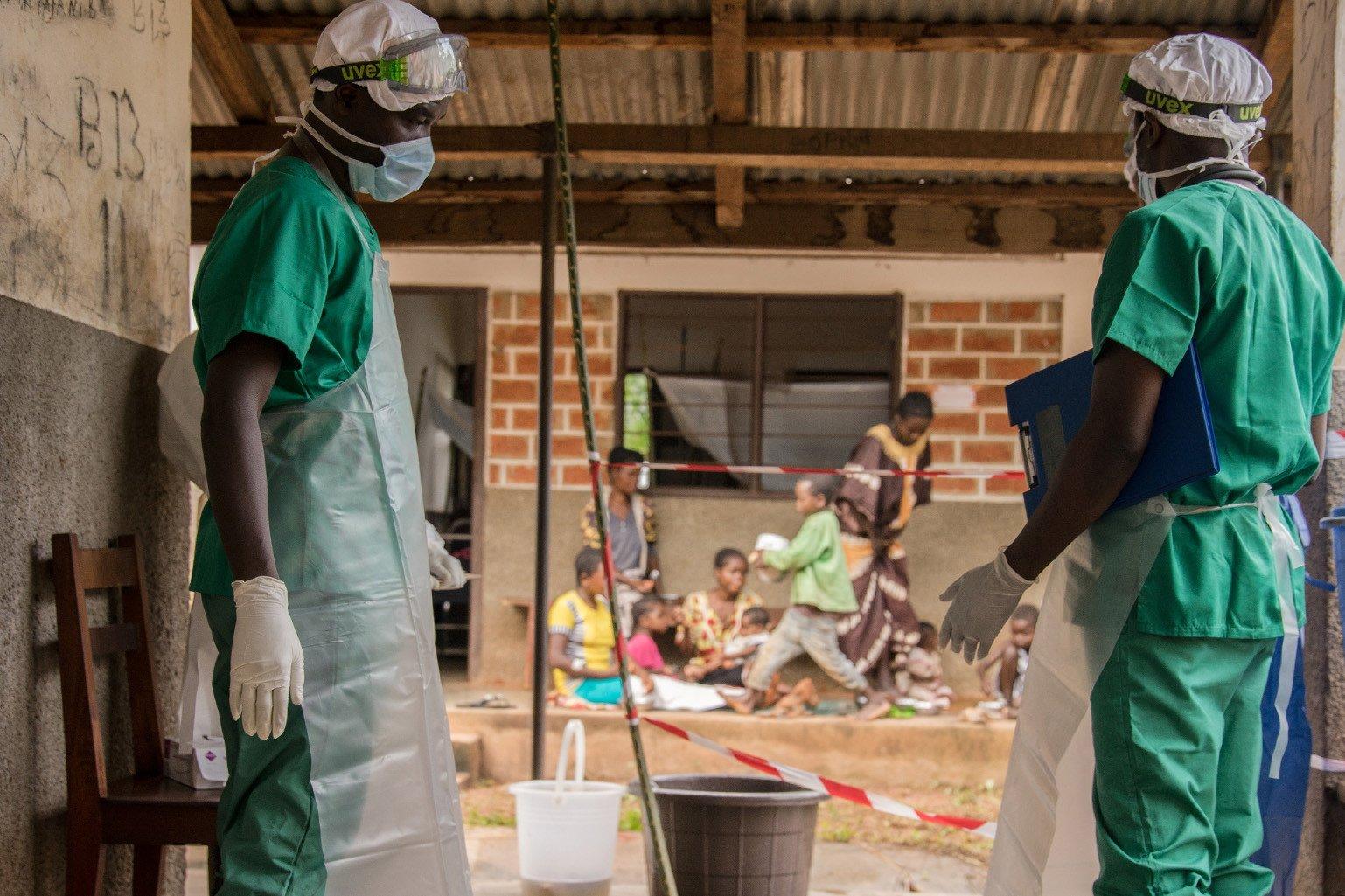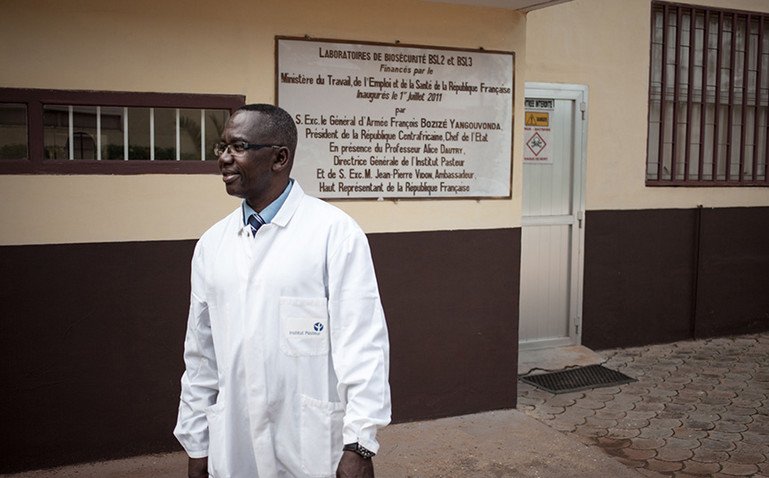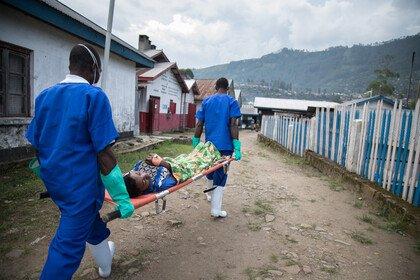
Mpox: is history repeating itself?
Dr Emmanuel Nakoune and Dr Piero Olliaro lead mpox (monkeypox) research in the Central African Republic, where the disease is endemic. We speak to them about their experiences, challenges, and why we continue to see the same problems emerging in our global response to infectious diseases.

Charles Bouessel/AFP via Getty Images
Mpox being declared a Public Health Emergency of International Concern is a stark reminder of the weaknesses that exist in the world’s ability to prepare and respond to outbreaks. While transmission has fallen in recent months, there have been over 80,000 confirmed cases worldwide at the time of writing in more than 100 countries. Researchers studying the disease in Central Africa for decades tell us about their work and why the recent outbreak demonstrates the need for health equity.
Dr Emmanuel Nakoune is the Scientific Director of the Institut Pasteur de Bangui, where he has been involved in mpox research for over 20 years.
Dr Piero Olliaro is a Professor of Poverty Related Infectious Diseases at the University of Oxford and Director of Science at ISARIC – a global federation of clinical research networks supported by Wellcome, the Gates Foundation and the Foreign, Commonwealth and Development Office – where he leads the clinical research programme.
Tell us about your work and research
Dr Nakoune: The research started in 2001 with the first lab diagnosis for mpox using PCR tests. Soon after, the Ministry of Health in Central Africa added mpox to a list of diseases for mandatory reporting and surveillance. By 2016, there was a significant increase in mpox cases. Following an epidemic in Nigeria in 2017, WHO called for increased mpox aid and surveillance across Africa.
One outcome was our expanded access use programme to test the effectiveness of an antiviral drug – tecovirimat or ‘TPOXX’ – in treating mpox patients. The programme is a tripartite agreement between the Ministry of Health and Population in Central Africa, Institut Pasteur Bangui and the University of Oxford.
Dr Olliaro: We are also setting up studies in the UK and EU based on the expanded access use programmes in Central Africa using similar protocols. These studies include:
- MOSAIC – an observational study in the UK, Switzerland and eight European countries to monitor disease and treatment outcomes
- PLATINUM – a double-blinded, randomised control study in the UK comparing the effects of tecovirimat to placebo for treating mpox in non-hospitalised cases
Using this data, we will collate results to better understand mpox.
However, there are differences to consider when studying mpox across locations. For example, different clades – types of virus variants – are prevalent in different countries. Clinical manifestations – physical results of the disease – are also different, most likely due to differences in disease transmission outside endemic countries.
What is an expanded access use programme?
Dr Olliaro: Expanded access use programmes make it possible to treat patients with a drug in a specific country when the drug is not registered for use but there is an indication that it may be useful, or while waiting for the drug to complete the registration process.
In 2018, tecovirimat was registered by the US Food and Drug Administration for use in the US for smallpox. This was part of a strategy by the US Department of Defence to protect against the biological threat of smallpox and other pathogens. However, as smallpox was eradicated in the 1980s, these approvals were based on experimental animal data and safety and tolerability in healthy volunteers, without clinical trials.
Since then, the drug has been registered to treat other orthopox viruses, including mpox, in the EU by the European Medicine Agency and in the UK by the Medicines and Healthcare Products Regulatory Agency. But tecovirimat is not registered for use in Central Africa, so our expanded access use programme allows us to test the drug on patients in areas where mpox is endemic.
What challenges have you experienced studying mpox in Central Africa?
Dr Nakoune: There are challenges around the surveillance of mpox in African countries. We don’t know how many people are exposed to the virus or how many become infected or diseased.
As well, as most cases occur in remote areas, diagnosis and treatment can be slow and difficult. There is often one or two weeks between the onset of symptoms and the administration of treatment. This is a huge problem.
One thing that would improve this is a point-of-care rapid test to provide a provisional diagnosis in the field before confirming the results in the central lab. We hope to set up a study in collaboration with FIND – a Geneva-based organisation specialised in studying diagnostics – to assess the performance of various point-of-care rapid tests for mpox.
Additional challenges include security and political instability in some African countries and a lack of coordinated approach to mpox.
What impact do you hope your research will have?
Dr Nakoune: We want to reduce the risk of death through our research, particularly in children. We have seen positive outcomes already with the successful treatment of 14 patients with mpox in a previous phase of the programme. However, one patient later died due to circumstances in their village unrelated to the disease or treatment.
Dr Olliaro: In addition, we have reinforced and strengthened the capacity for identifying cases and administering treatment through our programme. Our team can enter remote areas more often and diagnose and treat patients sooner.
This will hopefully help to change perceptions about mpox treatment, which has mostly been palliative in the past, and encourage more people to seek treatment. We also hope to reduce the stigma associated with a skin disease as obvious as mpox.

Dr Emmanuel Nakoune outside the Institut Pasteur de Bangui on 31 May 2018.
Florent Vergnes /AFP via Getty Images
How has current outbreak and global attention impacted your research?
Dr Nakoune: I believe the increased global attention has had a positive impact on our research. The US National Institutes of Health recently agreed to support a multi-country surveillance study which includes the Democratic Republic of Congo, Cameroon, the Central African Republic, Congo, Ghana and Nigeria – six endemic countries – which is very positive. However, we believe this study could have started earlier but wasn’t a priority until now, which is frustrating.
"...attention is only paid when the disease hits high-income countries."
Dr Olliaro: We are busier than ever between the expanded access programme in Central Africa, the UK and EU studies and increased attention on our work, which is welcome but also taxing. Increased attention has also brought some additional frustrations as we see the same pattern repeating itself: despite being endemic to parts of Africa for decades, attention is only paid when the disease hits high-income countries.
What we want to avoid now is a lack of coordination and increased competition for resources and research. Instead, we need a non-competitive, coordinated approach with agreed-upon objectives and methodologies to ensure global research is unified, while at the same time recognising there is no one-size-fits-all approach or solution.
There is lot we still don’t know about mpox. From your perspective, what are the research gaps?
Dr Nakoune: Mpox research has been neglected because the disease was mostly only found in parts of Africa. Had it not spread worldwide to affluent countries, nothing would have changed. In terms of key areas for research, there have been very few studies on the epidemiology, reservoir, risk factors and transmission of mpox. This is despite the fact there have been up to 1000 cases per year in parts of the Democratic Republic of Congo since 2010.
Dr Olliaro: Research into different types of transmission is needed. There is a significant difference between transmission in Africa and transmission in the UK and other counties outside disease-endemic areas.
In Central Africa, there is animal-to-human transmission and human-to-human transmission. People living in remote areas where the virus is commonly found are infected by animals – known as ‘spill over’ – then bring the virus back to their local villages and communities where it’s spread through close contact.
Whereas transmissions in the UK and EU are mostly human-to-human, and in the current outbreak, concentrated in a specific community – those who identify as gay, bisexual, or other men who have sex with men (MSM) – which needs further research.
This also means vaccination strategies and interventions are very different. Different types of transmission in Africa make it more complex. We need the vaccine to be registered in Africa, but countries also need to think carefully about how to use it and develop vaccination strategies adapted to their own situation and needs.
In addition, we need research into a better intervention to identify, diagnose and treat cases earlier and into the effects of drugs and vaccines when deployed in different settings. Neither has been studied in clinical trials with humans and the effects could be different when tested on clade I in Central Africa compared to clade IIa in western Africa or clade IIb outside Africa.
What do you consider to be the main barriers preventing an effective global response to mpox?
Dr Olliaro: Some of the main barriers include a lack of surveillance, coordinated response and extensive research into mpox, particularly into the transmission and effects of treatment and prevention in different settings.
Another potential barrier in western countries is the stigmatisation of specific communities where cases have so far been concentrated, for example, MSM. This is a sensitive subject that needs to be handled with care. We need to continuously remind ourselves and the public that mpox is not a sexually transmitted disease. We must avoid stigmatising people and groups and prevent the same narrative that was applied to HIV being applied to mpox. Any interventions must also involve representatives of the LGBTQ+ community in order to be effective.
How can we make access to mpox drugs and vaccines more equitable?
Dr Olliaro: While it was recently reported that there is no limitation in terms of the production of tecovirimat, availability is a problem. Only one company in the world currently produces the most recent and safest vaccine, and it stopped production prior to the recent outbreak.
High-income countries are purchasing and stockpiling the limited supply leaving none for African countries that need them the most. We had the same problems with Covid-19 and Ebola – history is repeating itself. Only with slowing transmission and vaccine dose fractioning may richer countries be willing to share their stockpile.
Diversifying manufacturing is important. For mRNA-based vaccines, WHO supports countries like South Africa to establish the technology to produce their own – technology which can be used to create other vaccines. It is essential to establish this technology in other countries to ensure a faster and more equitable response. Although, there are issues around intellectual property associated with these products and technologies, which is a huge problem.
Essentially, we need to go back to the drawing board and identify an overall equitable approach for all infectious diseases that is permanent, durable, and sustainable, otherwise, we will continue to have these conversations.
What can we learn from the recent mpox outbreak to prevent future escalation of infectious diseases?
Dr Olliaro: We must address the infectious diseases in their entirety, not on a case-by-case basis. We hear the term ‘pandemic preparedness’ a lot – this is a problem. Preparing for a pandemic means that we only become interested in diseases when they become a public health emergency. Instead, we should address diseases earlier during outbreaks or smaller epidemics to avoid the risk of wider spread. This means addressing two overarching problems:
1. How we prioritise research and development of drugs and vaccines to ensure they are accessible and affordable to lower-income and endemic countries.
2. How we develop and distribute medical interventions for epidemics and outbreak diseases.
This is also true of other diseases in Africa that will most likely not spread to other countries due to the way they are transmitted. These still need to be addressed if we are to ensure health equity. The term ‘global health’ is supposed to mean improving and achieving health equity for people worldwide. But in reality, the world only seems to care about diseases when they spread to the ‘Global North’.
We’re funding research to better understand what causes and drives infectious diseases to escalate and the solutions to control their impact.
There are currently no open funding opportunities for Infectious Disease. Learn more about the funding we provide.
The virus name has been changed from "monkeypox" to "mpox" throughout this article in line with recommendations from the World Health Organisation (WHO).
The article was first published on 7 October 2022.
